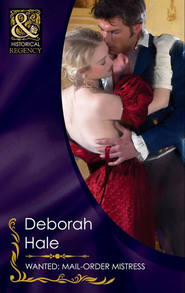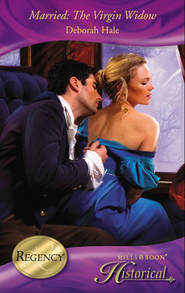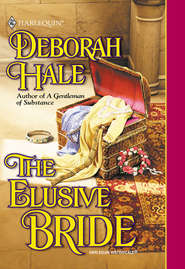По всем вопросам обращайтесь на: info@litportal.ru
(©) 2003-2024.
✖
Bought: The Penniless Lady
Настройки чтения
Размер шрифта
Высота строк
Поля
The man wanted to raise his family to the kind of prominence hers had once enjoyed. Was that so contemptible? Some distant forebearer must have had the ambition and good fortune to elevate the Dearings.
“Think of the talk.” Uncle Henry set aside his glass. “Just when the other scandal was finally dying down.”
Was he afraid her actions might cost him the rich bride he sought to snare?
“Break it off, Artemis,” he entreated her. “If you have your heart set on keeping the child, perhaps something can be done. It will not be necessary for you to wed that odious man.”
There it was—precisely the concession she’d hoped to wring from her uncle with the threat of marrying Hadrian Northmore. If she and Lee left Bramberley straightaway for some remote spot, Mr. Northmore would have little chance of finding them before he was obliged to return to Singapore. She would have what she wanted without being bound to the man who provoked far too many intense, unwelcome feelings in her. The man who would always be a reminder of what she had lost.
But as she prepared to accept her uncle’s terms, a pang of conscience made Artemis hesitate. How would she feel if Hadrian Northmore took Lee and sailed off to the Indies where she could not follow? She would consider herself wickedly wronged, of course. Then how could she contemplate doing something similar to him? Another factor also weighed on her decision. It was one even Uncle Henry could understand.
“If you had made that offer last week, sir, I would have accepted most gratefully, but now I must decline.”
“Why on earth…?” her uncle sputtered.
“Because I have given Mr. Northmore my word.” Artemis struggled to subdue her misgivings. “And you have always told me the word of a Dearing is sacred.”
“The solemnization of a marriage is always a sacred privilege.” The vicar of St. Botolph’s beamed at Hadrian as they stood on the steps of the old church awaiting his bride’s arrival. “But never more than in this case.”
“I am glad you approve.” Hadrian was not sure what the vicar meant. “To be honest, I’m relieved you are willing to perform the ceremony, under the circumstances.”
“More than willing.” The vicar pushed up his spectacles. “Honored. Delighted!”
He was a slight, middle-aged man with thinning white hair and mild blue eyes. His air of naive charity was difficult for a practical man like Hadrian to fathom, though he found it rather disarming.
His face must have betrayed his puzzlement, for the vicar offered an explanation. “Your marriage to Lady Artemis exemplifies a true Christian spirit of reconciliation after the tragic events of the past. I pray Our Lord will richly bless your union.”
Reconciliation with the Dearings? It was all Hadrian could do to keep from venting a blast of bitter laughter in the vicar’s face. At the same time, it troubled his conscience to receive undeserved praise for such virtuous motives. His marriage to Lady Artemis was based on hard necessity and cold mistrust, nothing more.
“We both want what is best for the child.” Unable to meet the vicar’s innocent gaze, Hadrian pulled out his watch and flicked it open. Then he peered up the road. “I hope Lady Artemis has not changed her mind.”
It had taken him three days haunting the Doctors’ Commons in London to secure the special license. Every hour his impatience had grown as he remembered her plea for haste. What if she had second thoughts and decided to fight him for the child?
The vicar gave an indulgent chuckle. “If I had a shilling for every nervous bridegroom I’ve heard utter those words, I could easily fill the parish poor box.”
Hadrian contorted his mouth into a mirthless grin. He doubted any other groom had such good reasons for fearing his bride might not show up for their wedding. After a final glance at his watch, he clicked it shut and stuffed it back in his pocket.
The rumble of horses’ hooves drew his gaze back to the road. He recognized the yellow post chaise he’d dispatched to Bramberley to fetch Lady Artemis and his nephew.
He strode toward the entrance to the churchyard, a wrought-iron gate set in a low stone wall. When the carriage came to a halt, he pulled the door open and prepared to hand Lady Artemis out. Instead, she bundled his nephew into his arms, then climbed from the carriage without his assistance.
The child let out a squeal of laughter and wriggled his sturdy arms and legs. It was like trying to hold a squirming piglet. Conflicting inclinations warred within Hadrian. Part of him wanted to hoist the lad in the air, like a prize he’d won after a hard-fought contest. Another part warned him to be careful. It would be far too easy to grow attached to this appealing little fellow.
Holding the lad in an awkward grip, Hadrian peered past Lady Artemis into the empty interior of the carriage. “Where’s his nursemaid?”
“He does not have one.” Her tart tone suggested the question was ridiculous, perhaps even offensive. “I told you I have cared for him from the moment he was born.”
So she had, Hadrian admitted to himself. But he could not believe she’d meant the day-to-day routines of tending a child this young: feeding, dressing, washing, changing linen, and soothing him when he was ill.
His nephew’s squeals took on a fussy note.
“Hold him up to your shoulder,” Lady Artemis advised, “so he has a good view of everything. Then perhaps he won’t be so anxious to get down and walk about.”
Turning away from him, she greeted the vicar with grave courtesy.
Reverend Curtis bowed. “As I was telling Mr. Northmore, it gives me great pleasure to preside over your nuptials. I consider this a most gratifying symbol of Christian forgiveness between two families who have—”
Lady Artemis stiffened. “Thank you for permitting the ceremony to take place here. Dearings have worshipped at St. Botolph’s for centuries. I cannot imagine being married anywhere else.”
“Will the Marquis and Lord Edward be joining us?” asked the vicar.
“I am afraid that will not be possible. My uncles are…indisposed at present.”
Hadrian could guess the cause of their indisposition. He wondered if Lady Artemis had risked a permanent breach with her uncles in order to do the right thing for her nephew. That possibility kindled a reluctant glimmer of admiration for her.
Perhaps to forestall any more awkward comments from the vicar, Lady Artemis began walking toward the church. “Have witnesses been arranged?”
The vicar nodded. “My sister and the parish clerk have agreed to witness the ceremony and sign the register.”
Hadrian trailed after them with his nephew in his arms. Just as Lady Artemis had predicted, the child gazed around him, taking everything in. Whenever his eyes met Hadrian’s, he flashed a wide, wet grin. If his aunt had tended him since his infancy, she’d done very well. The lad appeared healthy, happy and reasonably clever for his age.
They entered the church, which was softly lit by scattered candles and spring sunshine filtering through the stained glass of the altar window. It depicted a cloaked monk holding a traveler’s staff. The place reminded Hadrian of another old country church, far to the north.
As they followed the vicar down the aisle, Hadrian’s small nephew seemed to decide the church was too quiet.
“Ah-do-ma-ba!” He made a sudden grab for Hadrian’s ear, doing his best to yank it off. His other hand found Hadrian’s nose and gave it a sharp twist.
“Ow!” The pain shocked Hadrian back into the broad northern dialect of his youth. “Giveower and whisht, ye blasted wee bug—”
Artemis let out a horrified gasp that cut him off before he blurted out something very rude in church.
Taking advantage of his momentary confusion, she wrenched the child out of his arms. “I will thank you not to take such a rough tone with Lee. He is far too young to know what he is doing.”
Her icy rebuke stung Hadrian more than his hot outburst seemed to have bothered their nephew. The wee imp chortled as if he knew he’d done something naughty and managed to get away with it.
Hadrian rubbed his smarting nose. “He’s none too young to start learning to mind.”
He sensed she wanted to fling a pithy retort at him, but by now they had reached the chancel steps, where their witnesses were waiting. Instead she turned away from him to greet the vicar’s sister, who looked absurdly like her brother in a voluminous black dress and high white collar. While the two women fussed over his nephew, Hadrian shook hands with the parish clerk. The vicar took his place and spent a moment leafing through his prayer book.
Once he found the right page, he cleared his throat and launched into the service. “Dearly beloved, we are gathered together here in the sight of God, and in the face of this congregation, to join together this man and this woman in holy matrimony.”
Those words took Hadrian back to the last time he’d heard them, in Fort St. George, Madras. He could scarcely imagine a wedding more different from that one than this. He and his first bride had been so eager to wed. The early struggle to make his fortune was behind him, while the tragedy of his past had begun to loosen its grip upon his heart. Margaret’s vivacity and contagious high spirits had helped him look to the future with boundless hope.
He’d dreamed of siring a family of fine sons to carry on the Northmore name—lads who would never experience the danger and deprivation he and his brothers had endured. He’d foreseen a lifetime of happiness ahead with a family he would adore. Instead, after only two sweet, fleeting years, he’d lost his wife and infant daughter. And he had learned what a perilous thing hope could be.
An expectant pause wrenched Hadrian back from his painful reverie. Too late, he realized the moment for confessing any impediment to his present marriage had passed. Did the fact that he knew almost nothing about his bride count? Or that he did not much like the lady, let alone love her?
The vicar could not have guessed any of that, or he would never have fixed Hadrian with such a benevolent smile and asked, “Wilt thou have this woman to thy wedded wife?”











